CQN continues its enthralling and EXCLUSIVE extracts from Alex Gordon’s book, ‘That Season In Paradise’, which takes us through the months that were the most momentous in Celtic’s proud history.
Today, we look at another dramatic step along the team’s destination towards the record books.
JOCK STEIN didn’t quite get around to instructing the assembled squad of players to dismiss thoughts of conquering Europe, but he left them in absolutely no doubt that the prime target for season 1966/67 was to retain the First Division championship, annexed in some considerable style the previous term for the first time since 1954. Any status earned on foreign fields would be accepted as a bonus; ultimate victory in the European Cup wasn’t included in anyone’s aspirations.
I interviewed all eight existing European Cup winners when I was writing the book, ‘The Lisbon Lions: 40th Anniversary Celebration’. I allotted a chapter to each member of the historic team to give their unique view on events. Billy McNeill’s thoughts on Celtic’s chances of actually winning the trophy were quite candid. He admitted, ‘The European Cup was a trophy that belonged to other teams, glamorous sides from other parts of Europe. Only Real Madrid, six times, Benfica (twice), Inter Milan (twice) and AC Milan (once), had won the most prestigious prize European football had to offer. British football merely had its nosed pressed up against the window, wanting to get in, but being completely ignored.’

I didn’t discover one player who admitted to having prior knowledge that the European Cup Final for that particular season would be played in the Portuguese capital of Lisbon.
So, the sharp focus for the campaign was the safe delivery of a second successive title. That being the priority, the Celtic manager would have been reasonably satisfied his team were league leaders going into the month of March. After twenty-four games, it was obviously a straight fight between the Parkhead side and their ancient foes Rangers for the crown.
Celtic had won nineteen, drawn four and lost one to rack up forty-two points. Their persistent challengers from Govan had played the same amount of games and had won eighteen, drawn four and lost two to amass forty points, only two adrift of Stein’s team in pole position. Celtic had scored a highly laudable eighty-three goals, eleven more than their pursuers, but had conceded twenty-five, with the Ibrox outfit losing four fewer. There were still ten games remaining, but the two nearest teams to the Old Firm, Aberdeen and Hibs, already knew third top would be their best achievement; both trailed Celtic by ten points.
Jock Stein’s team ushered in the month with their European Cup quarter-final first leg against the Yugoslavian champions Vojvodina in a frosty, cheerless and aptly-named Novi Sad. The manager’s pre-match talk was about the importance of ball retention against a team who knew how to use the object fairly expertly. Jim Craig was introduced at right-back for his European Cup debut with Tommy Gemmell switching wings and Willie O’Neill dropping out.
With twenty-one minutes to go, Stein would have been satisfied. It was goalless and Ronnie Simpson hadn’t been unduly perturbed. And then Gemmell, so often the matchwinner, made a costly mistake. On a difficult, flint-hard surface, the left-back decided to attempt a passback, a movement never encouraged by his boss. Unfortunately, Gemmell’s wayward ball fell between Bobby Murdoch and John Clark and that was all the darting Svemir Djordic needed to intercept the pass, square it to Milan Stanic and the winger expertly placed a low drive away from the advancing Simpson.
The legendary Vujadin Boskov, later to manage some of the biggest teams in Europe including Real Madrid, had ordered his side to get a two-goal advantage and his players did their best to comply with his wishes. However, it is to Celtic’s spirit and credit that they refused to panic or fold in front of such impressive opposition. The Slavs had to be content with Stanic’s solitary effort as the visitors shut up shop with Simpson, Billy McNeill and John Clark repelling some frantic raids for the next twenty minutes.
Gemmell said, ‘I didn’t make any excuses back then and I’m certainly not going to do so now. However, I underestimated two things that night: the dodgy surface and the pace of a player called Djordic. The pass might have looked like a lost cause to the Slav, but he didn’t give it up and his sheer acceleration defied the elements. He got to the ball first, squared it for his team-mate and he thumped it past Faither, who was helpless. I got an earful from my goalkeeper and I put up my hands and said, “Sorry, lads, my fault.” I felt dreadful. One slack pass and we were smack in trouble – all our good work had gone for precisely nothing. I knew we would be up against it in Glasgow.’
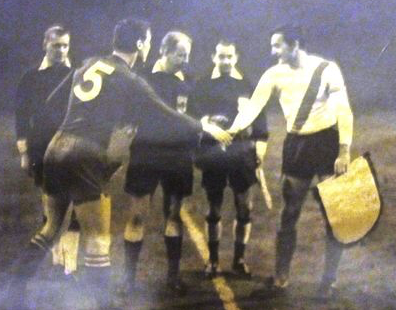
THE HANDSHAKES BEFORE THE DRAMA…Billy McNeill meets the Vojvodina skipper.
Bertie Auld recalled, ‘Of course, we were all disappointed afterwards in the dressing room. Tommy had made a mistake and he admitted it. However, a team-mate, who shall remain nameless, was so upset he said, “Why did you have to try something fancy? Why not just hoof it up the pitch?” Big Jock heard the comments and immediately rounded on the player. He practically shouted, “Have you forgotten the amount of times Tommy Gemmell has won games for us?” That was typical of the manager, though. He wouldn’t have anyone abusing any of his players – unless, of course, it was him!’
Ronnie Simpson paid his tribute to the slick Slavs. ‘Vojvodina were undoubtedly the best side we met in the European Cup. They were a disciplined team with a lot of talent and well groomed by Vujadin Boskov, a former international left-half of world class. I thought we paced the game in Novi Sad to perfection and did everything right. Then just as we had the Yugoslav champions on the retreat, we lost a goal – and a daft one at that.
‘In sixty-nine minutes, Tommy Gemmell tried to push the ball back to me from a fair distance and didn’t get enough on the ball. It ended at Stanic, their outside-left, who was onto it in a flash and fairly romped it past me. John Clark almost got there, but, like most of us, didn’t expect Tommy to muff his kick. That changed the pattern of the game a little, giving them fresh heart and we had to be content with a 1-0 defeat, the first time we had lost a leg on our European journey.’
Bobby Murdoch agreed with his keeper about the qualities of the quarter-final opponents. He remembered, ‘Vojvodina were the hardest team we met, no argument. Jock Stein had checked them out prior to the first game and had us mentally prepared. He had warned us we would have a hard match and that they moved like a British side. They were a physical team, not unlike ourselves and the Germans. They wouldn’t panic, they wouldn’t quit. The Boss was right.
‘They came at us so fast and furiously in Novi Sad that we were caught out in those early minutes. Their pace and strength surprised us. But we held them, sometimes having to pull eight players back in defence to combat their energetic attacking waves. In our own breakaways, we found they had a magnificent centre-half in Ivica Brzic, who was built like a tank, and a smart keeper in Ilija Pantelic, who was quite the darling of the crowd.
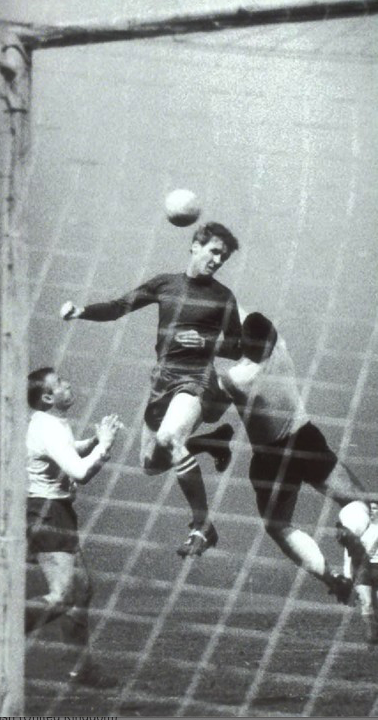
FIST IN TIME…Billy McNeill is foiled on this occasion as Vojvodina keeper Ilija Pantelic punches clear.
‘They were a hard team, who didn’t shirk a tackle, but they were fair and, though we took a bit of stick from them in the opening part of the game, I must say I thoroughly enjoyed it. We had paced our game so well that by the interval the Yugoslavs were beginning to feel a bit frustrated. I felt that, tactically, we had played as well as we had ever played in Europe. Then just when they were beginning to sag and we were beginning to show more in attack and take a very tight grip on the game, we lost a silly goal. Tommy Gemmell, under a little pressure on the left, decided to turn and push the ball back to Ronnie Simpson. Unfortunately, Tam didn’t hit the ball hard enough. By the time John Clark realised the ball wasn’t going to make it, they had scored. Were we sick? And how do you think Tommy Gemmell felt? This inspired the Yugoslavs to pick up their game and so we finished the first leg a goal down.
‘The crowd were so excited that they ran on to the field and carried their keeper off the ground. I don’t know why they chose Pantelic. They should have carried off their outside-left who was smart enough to take advantage of our one and only boob. When the manager came into the dressing room after the match, he took one look at Tommy Gemmell, who was sitting with his head in his hands, and said, “Get your head up off the floor. You’ve won games for us. It’s not over yet.”‘
As an interesting postscript, the classy midfielder added, ‘Prior to the banquet at the Petrovardin Fortress, which overlooked the River Danube, we saw Inter Milan beat Real Madrid 2-0 on TV in the second leg of their European Cup quarter-final to win 3-0 on aggregate. We figured the great Real Madrid had problems much greater than ours. We were still in the competition!’

Simpson reflected on a meeting with his opposite number at the banquet. ‘The Vojvodina keeper, Ilija Pantelic, who was the No.1 in Yugoslavia, sought me out. He told me he was amazed I was still playing in goal at the age of thirty-six. He told me, “If I’m still playing at thirty or thirty-one, I’ll consider myself lucky.” He made me feel like an old man!’
Pantelic, in fact, had caught the eye of Jock Stein when he watched the third-game play-off against Atletico Madrid. The 6ft 2in Slav looked the perfect sporting specimen, an ideal prototype for a goalkeeper. He was agile, possessed good hands and, generally, controlled his penalty area. The Celtic manager would also have noted he took his team’s penalty-kicks and had actually scored from the spot against the Spaniards in Vojvodina’s 3-1 win in the first game. There was talk of Stein surreptitiously making enquires about the availability of the shotstopper, but he received no encouragement from the Slavs. Pantelic, though, left Vojvodina for French football in 1969 and finished his career at Paris Saint German. He was thirty-five years old when he decided to hang up his gloves.
On matchdays, Celtic fans arriving early for the best places at which to stand and view the game from the terracing or enclosure would often witness the lone and thoughtful figure of Jock Stein pacing out the playing surface. The management and players would normally arrive at the ground by coach an hour-and-a-half before kick-off and one of the Celtic manager’s first tasks was to inspect the pitch. Big Jock, unlike other team bosses, used to irritate the Press by refusing to name a line-up until thirty minutes or so before a game. ‘Who would be expected to pay good money to go and see a film if they didn’t know who is starring in it?’ the reporters would often point out, with a reasonable amount of logic. They required the team for the Saturday editions of their newspapers, but, of course, their observations meant little to Stein. He never saw the point of making his selection public the day before a game when overnight conditions could see him making sweeping changes. As a gambler, he had no intention of showing his hand to a rival manager, either.
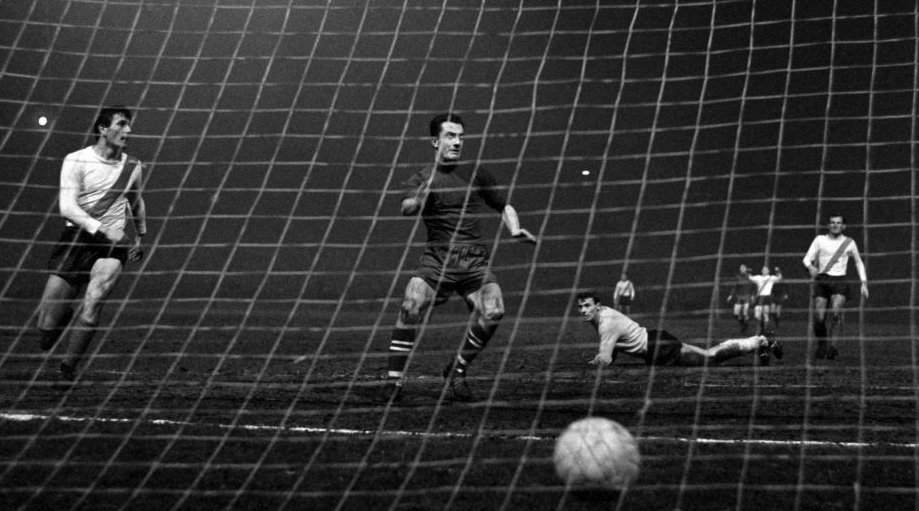
NUMBER ONE…Stevie Chalmers strikes from close range after Ilija Pantelic had failed to cut out a Tommy Gemmell left-wing cross.
On March 4, only three days after competing on the rock-solid pitch of Novi Sad, the Celtic manager was meticulously scrutinising the conditions of Love Street before putting his eleven together for the game against a St Mirren outfit who had, quite remarkably, taken a point from Parkhead in November, still the only team to manage the achievement at that stage of the season. On the odd occasion, Stein would call upon the services of trainer Neilly Mochan to bring a couple of balls out with him to roll along the top layer. Only when he was totally satisfied, did Stein announce his formation to his players and have the team lines delivered to the match officials, the opposing manager and directors of both clubs. On this particular afternoon, the heavy going meant an unwanted day off for Jimmy Johnstone with John Hughes getting the green light to play on the right wing.
Once again, Stein’s scrupulous, diligent eye for the most minute of detail worked in Celtic’s favour. Hughes powered through the stamina-sapping Paisley sludge as the champions stormed to a 5-0 victory. Goalkeeper Denis Connaghan, his side’s hero in their 1-1 draw in Glasgow, had already given the impression he would be picking up where he left off against his favourite team four months earlier. For half-an-hour, with Hughes running amok on the right touchline, Celtic subjected the Saints defence to a fearful battering without any substantial reward.
In the thirty-first minute, however, Tommy Gemmell embarked on another lung-bursting overlapping expedition on the left wing before bending in an inviting centre. Willie Wallace read the intentions of his team-mate with flawless timing and arrived on the scene at the precise moment to inflict maximum damage and tuck the ball beyond the helpless Connaghan. It remained that way until three minutes after the turnaround when Bobby Lennox doubled the advantage and, within minutes, Hughes repaid his manager for his decision-making, by blasting in the third. With the exhausted Paisley rearguard on the point of collapse, Gemmell zipped in a penalty-kick in the eighty-third minute and Wallace grabbed another in the dying embers of the encounter.
Near the end, Bertie Auld signalled to the bench he couldn’t continue after taking a dull one from a frustrated Saints opponent. Remarkably, Big Jock waved him off, but then refused to replace him. Johnstone was on the substitute’s bench and eager to get into the thick of things. However, Stein decided, with the team already so far ahead and the points assured, he would not take a chance with his little winger getting injured as the match neared its end. He wanted Johnstone fit and raring to go for the European Cup return against Vojvodina in midweek and, thus, Celtic finished the game with only ten men.
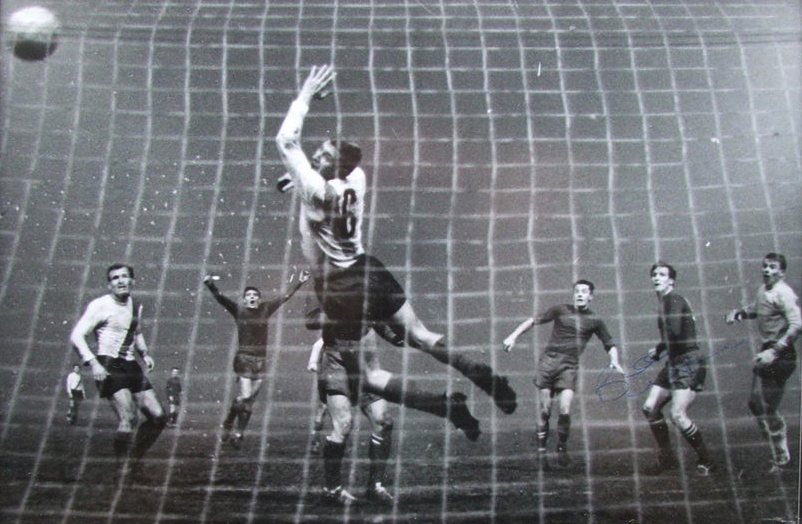
NUMBER TWO…Billy McNeill’s header soars high past Vojvodina defender Stevan Nesticki with keeper Ilija Pantelic stranded.
Celtic Park rocked like never before at the dramatic conclusion of the game against the champions of old Yugoslavia. The aggregate score was locked at 1-1 with less than a minute on the clock and a replay in the Dutch city of Rotterdam the following Wednesday the likely outcome. Celtic forced a corner-kick on the right and Charlie Gallagher, taking the place of the injured Bertie Auld, raced over to take it. On a savagely cold evening, the fans could see their breath plume in front of them. No-one complained, though. Collectively, 69,372 individuals came together for one last roar of encouragement. A crescendo of noise enveloped the east end of Glasgow.
Gallagher appraised the situation as bodies jostled for position, elbows visiting opponents’ ribs, jerseys being held in desperate grips. Billy McNeill took up his usual post at the edge of the eighteen-yard box. Gallagher shaped to take a short kick, but changed his mind and carefully swung the ball into the middle of the goal. Ilija Pantelic made a move to come off his line. McNeill, surging forward into the throng, was precision itself in his timing. The ball floated in the air as the Celtic captain climbed the highest. There was a thump as it smacked off his forehead. Pantelic looked back in utter anguish, defender Stevan Nesticki tried to perform heroic acrobatics on the line, but it was to no avail. McNeill’s header swished straight into the net with glorious meticulousness. Swedish referee Hans Carlsson blew for time-up exactly TWO SECONDS later and Celtic, extraordinarily, were in the European Cup semi-final.
Celebrated London Times sports journalist Geoffrey Green observed, ‘The last half-hour produced unbroken heartburn as Celtic thundered forward for the decider. In that space of time, Johnstone, who all through had been a thorn in the side of the Slav’s left flank, grew to even higher stature; and on the left wing Hughes, at last, began to use his pace and weight to add a second dangerous sector. The Vojvodina defence suddenly found itself the nut between the crackers. As the minutes unwound, there came great saves from the Slav goalkeeper Pantelic from Gallagher, Hughes, Johnstone, Hughes again, and even Gemmell and Chalmers.

‘All were looking at their watches as Gallagher clearly was taking the last corner-kick of the night. Over it came; up went a forest of heads, but there, the tallest of them, was the fair head of McNeill , who nodded the ball home to the top corner. That was victory at the last gasp and Parkhead, and its great swirling concourse, took wings.’
Celtic had levelled the tie just before the hour mark when Tommy Gemmell made amends for his first leg loss of concentration that may have cost so dear. He used John Hughes as decoy as he dashed down the left wing and pitched over an inviting cross. Pantelic sprang from his line, but the courageous Steve Chalmers was even faster off the mark and he got there just ahead of the keeper to knock the ball into the gaping net.
The hero of the hour, Billy McNeill, recalled, ‘I didn’t score a single league goal that season, but the one in the European Cup was a wee bit special, even if I do say so myself. I couldn’t have timed it better. I know Big Jock and all the lads rated Vojvodina as by far the best team we met that year, including Inter Milan. The Yugoslavs were superb technically, but were also fairly adept in possibly the not-so-finer points in the game. There was also some memorable mind-games going off the pitch between the Boss and their manager Vujadin Boskov.
‘Even before the first game, Big Jock clearly wasn’t impressed by Boskov’s pre-match prediction. The Slav boss stated emphatically he believed Vojvodina would be victorious by “at least two goals”. Jock thought, “Oh, really? We’ll see about that.” When they won by a solitary effort from Stanic, Boskov came out again and declared he hadn’t been too impressed by Celtic and his team would win again in Glasgow. Now if Boskov was trying to get Jock fired up for the return he couldn’t have done a better job. The Big Man spoke to the Yugoslav Press and went on record as saying, “Vojvodina are a very good team, but we are better and we will win in Glasgow.” It was sheer bravado because we all realised just how difficult the Slavs would be in the return leg.
‘Boskov and his players turned up at Celtic Park the night before the game and they wanted a work-out on the pitch under the floodlights. It was normal practice for teams to go through this routine as it made a lot of sense for them to get a feel for the conditions they are going to encounter twenty-four hours later.
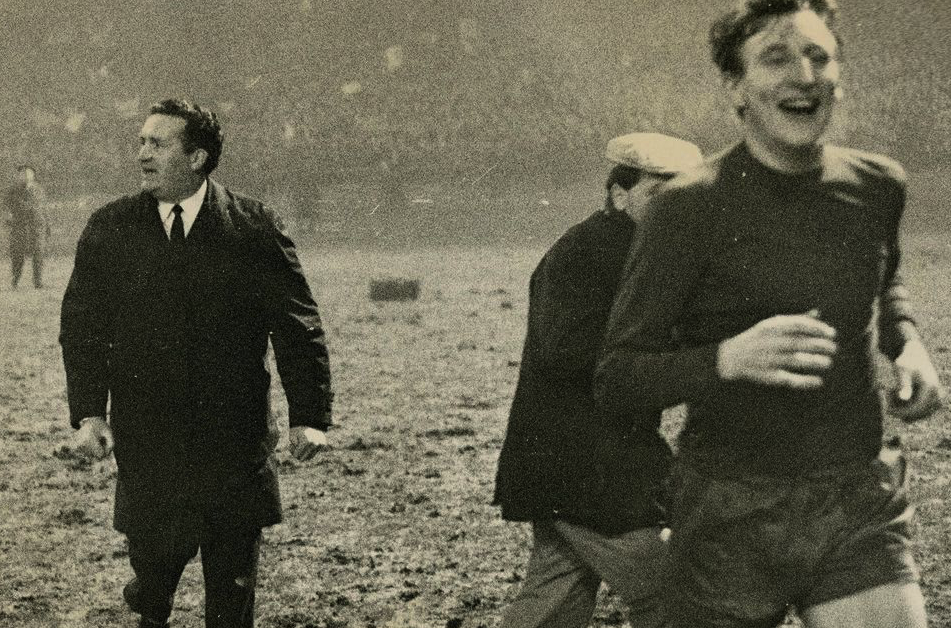
ALL SMILES…Jock Stein and Tommy Gemmell soak up the atmosphere at the end of a dramatic evening.
‘The Vojvodina boss wasn’t best pleased, then, when Big Jock gave him the news neither he nor his players would be placing a foot on the pitch at Celtic Park. “Sorry, there’s been too much rain in Glasgow recently,” Jock informed him. “We can’t take the chance of the pitch cutting up.” He did have a point, but Boskov was far from convinced. He made all sorts of protestations; he would take it up with the Celtic chairman, he threatened. Jock waved it away in his usual fashion. “You can train at Barrowfield and I’ll make sure the lights are switched on. Off you go.”
‘To say the Slavs were not amused would be putting it rather mildly. They were fizzing, but, at least, Boskov and his boys got the drift that Jock Stein was, indeed, the man in charge at Celtic. As far as football matters went, there was no higher power. Vojvodina, though, were determined to have the last word during the game in Glasgow. As I said, they were an extremely talented and resilient outfit and they weren’t slow to hand out a wee bit of punishment every now and then. We had to endure close to an hour of frustration before we got our own back when Stevie Chalmers made it 1-1 on aggregate after a typically unselfish run and cross from the left by Tommy Gemmell.
‘I have been told the referee blew for time-up two seconds after the restart following my goal. Now that is a late, late goal. We won a corner-kick on the right and I’ll always recall Big Jock waving us all up for one last assault on their goal. Charlie Gallagher, who had a sublime touch, raced over to take it. Actually, I think Charlie was about to take a short one, but a Slav defender raced to cut it off and Charlie changed his mind. Thank God!
‘Charlie was left with no option but to put the ball into the mix. There was the usual barging and jostling as I made my way forward. The Slavs had marked me very well at set-pieces and I hadn’t really had a sniff at goal. On this occasion, though, my timing was just absolutely spot-on. Charlie swung it in, I kept my run going, the ball hung in the air, I got a good leap, made superb contact and the next thing I saw was the effort soaring high into the net. Pantelic had strayed a bit from his line and they had a defender on the goal-line who did a fair impersonation of a goalkeeper as he leapt up with his left arm to try to keep the ball out. He was wasting his time – that was a goal all the way as soon as it came off my napper.
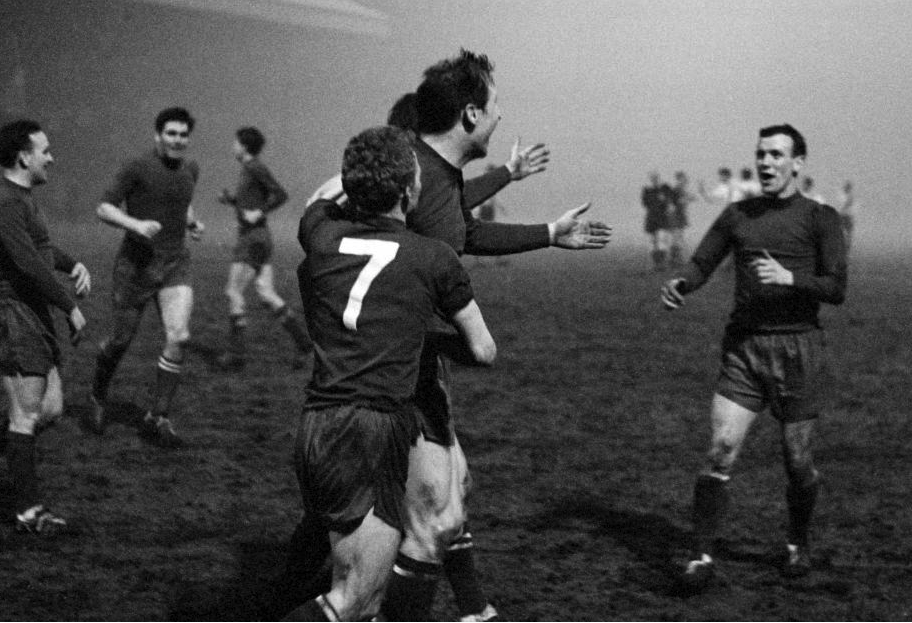
CHEERS…Billy McNeill is congratulated by Jimmy Johnstone and Bobby Lennox with John Hughes on his way to join in.
‘Vojvodina went crazy when the referee awarded the goal. They were convinced I had fouled Pantelic. I can hold my hands up all these years down the line and tell the world I didn’t even touch their goalkeeper. I was nowhere near him, as a matter of fact. However, you might ask Stevie Chalmers if he had blocked Pantelic! He may have taken a half-yard step in front of the big goalie when he was leaving his line in an effort to cut out the cross. So what? It was all part of the game back then as it still is today. Believe me, the Slavs weren’t slow in getting in front of me any time I came forward. But, thanks to Charlie’s deadball accuracy, there was nothing anyone could do to prevent me from making contact on that occasion and managing to do some damage.
‘I knew it was late in the game, but, honestly, I had no idea that it was quite as late as that. As I ran back to take my position in the heart of the defence, I shouted over at John Clark, “Keep concentrating, Luggy. We’re not going to lose a goal now.” Luggy just looked at me and said, “What are you talking about, Caesar? The game’s finished. It’s over and we’re through.” Seconds later it was, indeed, well and truly over and our great adventure was still on track.
‘I remember the Vojvodina players cracking up as they kicked off and the ref blew for time-up. Actually, one of their own players raced into the melee and started shoving his team-mates all over the place to get them to calm down. He was a big lad, too, and, thankfully, they did as they were told. It could have been very interesting going up the tunnel that evening. That tunnel could tell a tale or two, that’s for sure. These were the days before TV cameras seemed to spring up everywhere and sometimes there could be some “sorting-out” done in the darkness of that tight, little area that led to the dressing rooms. Not that I ever got involved myself, you understand!’
Stevie Chalmers recollected, ‘Scoring the most historic goal in Celtic’s history in Lisbon is something I will always treasure, but I would like to think I also played my part in beating Vojvodina in the quarter-final. And I am not talking about my goal that made it 1-1 on aggregate and set up the grand finale for Big Billy to head in the last-minute winner. Our skipper was accused of fouling their goalkeeper Ilija Pantelic, but I can now confess he didn’t come close to touching him – because I did!

‘It wasn’t a foul, though, I hasten to add. It was something that happened all the time in penalty boxes and I was blocked off a few times myself. However, on this occasion, I took a wee step in front of the keeper as he left his line in order to cut out Charlie Gallagher’s right-wing corner-kick. It was only a half-yard or so, but it managed to put Pantelic off his stride. He couldn’t get anywhere near the swirling ball and Big Billy, as he did so often, got his head to Charlie’s cross to bullet an effort high into the net. Celtic Park erupted! The Yugoslavs were pointing fingers at everyone. They shouted at the referee, but he was having none of it. The goal was good and he pointed to the centre circle.’
Chalmers was another convinced of the qualities of dangerous foes. He added, ‘Yes, like all the other Lisbon Lions, I really rated Vojvodina. You know I couldn’t name any of their outfield players although Pantelic was gathering a bit of a reputation throughout Europe as being a top goalkeeper. He was class alright although, to be fair, he wasn’t exactly overworked in the opening game when they won 1-0. It was an entirely different story in Glasgow, though, as you might expect. The atmosphere at Celtic Park was electrifying that night. The fans were in great voice and they did become our twelfth man.
‘Again, I was fortunate enough to score and it was all down to Big Tommy belting down that left wing. Both Tommy and Jim Craig would run all day up and down their wings. Tommy, on the left, swung in an inviting cross and I tried to get between the goalkeeper and a defender. It was one of those crossballs that just needed a touch to knock it over the line. Pantelic threw himself at it, but got caught up with his own defender – nothing to do with me this time, honest! – and the ball dropped right in front of me. I couldn’t miss and I just fired it over the line. That set up the big finish and Billy duly provided us with our semi-final passport – with a little assistance from yours truly.’
Bobby Lennox said, ‘People often ask me what was my favourite goal in that European Cup run. Well, it wasn’t one of mine! As it happens, I only scored two, in both legs of our 6-2 aggregate win over Nantes in the Second Round. Neither, I have to say, was particularly spectacular. However, Big Billy’s winner against Vojvodina was something special altogether. Naturally, I was overjoyed for all the obvious reasons, but I was also doubly pleased because we had stuck two past their goalkeeper, Ilija Pantelic.
‘I would like to believe I am a fairly easy-going type of bloke, but I really hated that guy. I know making a comment like that is way out of character for me, so please let me explain why I disliked the Vojvodina No.1 so much. In the first leg in Yugoslavia, I made a challenge for a 50/50 ball as I was quite entitled to do. I did it every week in Scottish football and no-one complained. Pantelic didn’t like being disturbed, though. I slid in, my momentum took me forward and the goalkeeper collapsed on top of me as he collected the ball.
‘It certainly wasn’t a foul, but Pantelic wasn’t too happy. He got to his feet and motioned to help me get up, too. It was all very sporting, but if anyone had bothered to take a closer look they would have seen the Slav had a handful of my hair as he ‘helped’ me back up off the ground. I’ve got a sense of humour, but that was no laughing matter. We were also fairly satisfied with the first leg result although, of course, it’s never ideal to lose by any margin in Europe against first-rate opposition. However, as we travelled back, we were all convinced we would overturn their one-goal advantage. Me? I just wanted to stick one or two behind a certain Mr.Pantelic to welcome him to Glasgow in no uncertain fashion. Alas, I didn’t get my wish, but we still beat them and that was the main objective all along.
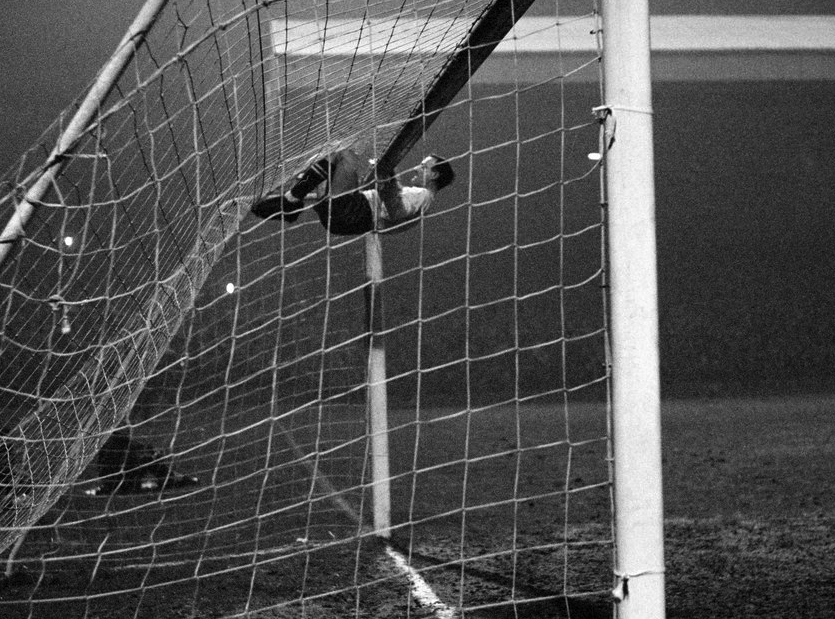
CROSSBAR CHALLENGE…Ronnie Simpson celebrates in unsual fashion at full-time.
‘However, if you see footage of our first goal by Stevie Chalmers have a look at what I’m getting up to. I’m right in the goalkeeper’s face and giving it “Yahoo!”. Normally, I would run to the goalscorer to offer my congrats and give him a pat on the head, but I just couldn’t help myself for making a beeline to their crestfallen keeper and letting him know exactly how I felt. I’m sorry, I had to do it. If I was happy then, you can imagine my feeling of sheer elation a minute from time when Big Billy sauntered forward in that manner of his and got his head to Charlie Gallagher’s beautifully-flighted right-wing corner-kick. My friend Pantelic was caught in no-man’s land as the ball soared high into the net. I kept away from him that time, I didn’t want to push my luck! He was a big guy, after all, and his side had just been sent reeling out of Europe. I must say in his favour, though, we shook hands at the end of the game and he wished me all the best for the rest of the competition. I appreciated that.’
Jim Craig, who had missed the earlier rounds against Zurich and Nantes, reflected, ‘The guy who gave me most bother was Vojvodina’s Milan Stanic, who got their goal in the first leg in Novi Sad. He was skilful and tricky, but I remembered Big Jock’s words. He said, “Lean on him and see if he has a heart that size of a pea”. So, dutifully, I “leaned” on Stanic at one point. Lo and behold, he suddenly thought it was a better idea to go and play somewhere else on the field. Problem solved. Vojvodina were a fabulous team, though. They played in a typical, controlled Eastern European fashion and were superb at keeping possession. You can run for miles with the ball at your feet, but it’s not so easy when you are chasing around trying to get it back. That can be exhausting and the Slavs put a lot of emphasis on retaining possession. We may have lost the first game 1-0, but we weren’t disheartened. Simply put, we believed we could overturn their advantage in Glasgow. And so it proved, but we did leave it a bit late, didn’t we?
‘I thought we played well that night and, unfortunately for yours truly, I was next to Big Jock in the dug-out on the right touchline throughout a dramatic second-half that was fraught with anxiety. All I could hear above the din of almost 70,000 fans was “Cairney, do this” or “Cairney, do that”. It wasn’t easy playing right-back when Big Jock was in full flow. I used to look round every now and again and shout, “Why don’t you have a go at Bobby Murdoch or Wee Jinky?” Luckily for them, they were probably out of earshot and were spared the verbal volleys from the manager. Big Jock would also yell at you to pass on instructions. Aye, right! I simply concentrated on my own game – that was enough to be going on with.’
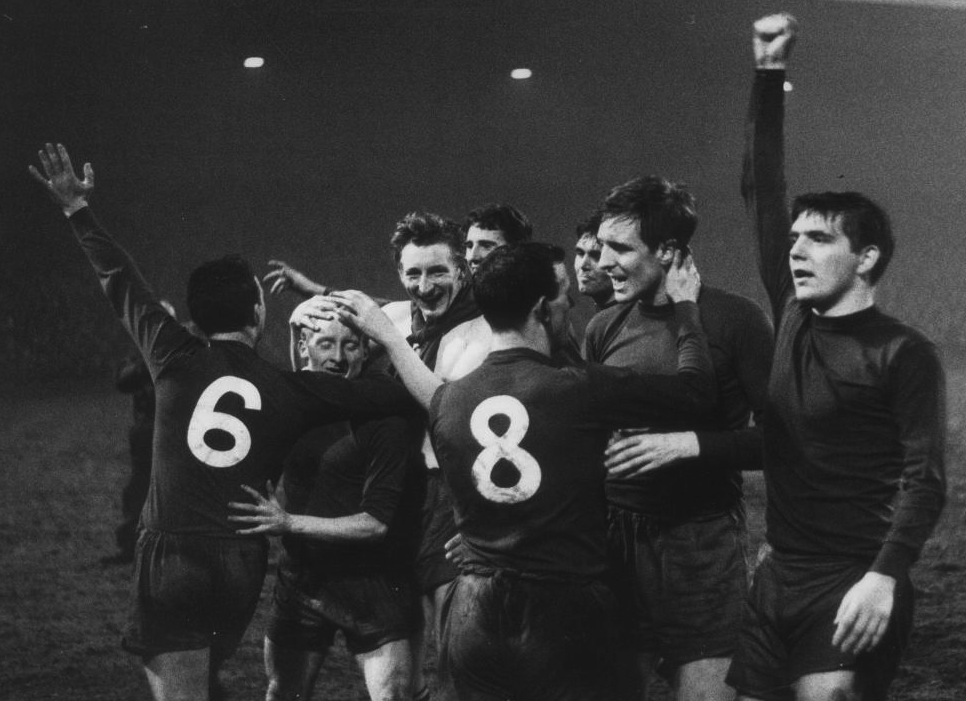
CELTIC TRIUMPHANT…Bobby Murdoch raises his right arm in salute amid his team-mates’ celebrations.
Bobby Murdoch said, ‘We were told during the preparation for the match that we had not to panic if we didn’t score early. We had to be patient. The game ran ninety minutes and we would just have to wait until we got our chances. We knew it would be a fight. Vojvodina were a big, powerful side and, unlike our previous European Cup opponents, they had something to hold onto. They didn’t have to come at us. We had to go at them and get the goals.
‘At the interval, we still hadn’t scored. And neither had they. We had gone at them hard from the whistle and pushed them from every angle, but we couldn’t break them down. Into the second-half, we were beginning to despair a little. Then came a break down the left from Tommy Gemmell, so desperate to make up for his slip the previous week. Tam hit the ball hard across goal and Panetlic came out to meet it, let it slip onto his shoulder and the ball dropped to the ground. This was the kind of chance Stevie Chalmers lapped up. He was on to it like a hawk and hammered the ball into the net. Vojvodina were a different side now. Earlier, they had been deliberately slowing the pace of the game with their keeper bouncing the ball about and taking a long time to kick it out. Their centre-half was also regularly knocking the ball back to his keeper when he could have found a man upfield.
‘Celtic were pushing hard now with the crowd whipping us on. Seventy minutes…eighty minutes…eighty-five minutes…and we were beginning to think of a play-off in Rotterdam. An extra match we didn’t want as we were involved in so many games at home. Then in the final minute of the game, we got a corner-kick on the right hand side of the field. Charlie Gallagher ran out to take the kick and obviously meant to take a short one, when Jimmy Johnstone ran out with him. Dimitri Radovic, the Yugoslav full-back, raced out when he saw Charlie’s intentions.
‘As always, Billy McNeill moved up to the edge of the Vojvodina penalty area. Smartly, Charlie decided on a long kick. Over it came and there to meet it was the head of Billy McNeill to hammer the ball high into the Vojvodina net. What a goal! What a winner! The Slavs were beaten, they just couldn’t come back after that. There wasn’t time. I’ve never seen the Boss so excited. He didn’t want to wait for the final whistle. He wanted to race onto the pitch there and then and smother us in congratulations. The crowd scenes were indescribable. We had made it by seconds.’

Even veteran Ronnie Simpson was almost swept off his feet by the euphoric wave hurtling around the ground at the end. He said, ‘Celtic Park was a mad-house with me as mad as a hatter. Afterwards, I remember what the Boss had told us at half-time. “Get a grip of the middle of the field. You’re giving Vojvodina too much space to work in. I want you to stay in constant attack.” It worked.’ Pictures in the Press the following day showed the thirty-six-year-old goalkeeper swinging from his crossbar like an overgrown kid. ‘I couldn’t help myself,’ he said by way of explanation.
TOMORROW: MARCH CONTINUED: CELTIC FACE STRAIN GAME

